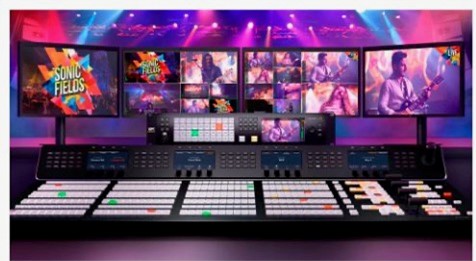“Still waiting for the technology to catch up with the idea. I mean, it’s not easy, there are a lot of moving parts.” – “Night at the Museum,” 20th Century Fox, 2006

Finally, things are starting to feel like there really is a new normal. After the pandemic shutdown, followed by the squeezing of the industry by the US dual industry strikes, the entertainment industry has clawed back its two main events that mark the beginning of the end of the year—the Toronto International Film Festival (TIFF) and International Broadcasting Convention (IBC).
One (TIFF) does a super job of attracting some of the best (and, occasionally, edgiest) films from around the world, while the other (Amsterdam’s IBC) marks a great gathering of leading-edge/bleeding-edge products, services, and technology that folks will be using to tell even better video stories for us to enjoy.
TIFF isn’t just an event where film hopefuls gather; they’re there to snag sales for domestic and international distribution. It also gives us a chance to see what’s new and expanded in the most aggressive film production locations in North America.

Sure, we’re glad to see US production centers are expanding in Atlanta, Tucson, the New York area, Austin, and other locations. But the Canadian, Ontario, and Toronto governments just seem to be more serious and committed to attracting project production north of the border by offering significant incentives.
In addition, TIFF attendance gives us a chance to catch up with old friends who tell us they are increasingly busy and in demand as writers, directors, producers, designers/decorators, filmmakers/cinematographers, DITs (digital imaging technicians), sound/video techs, sound/video editors, VFX artists, and animators. But don’t jump on the next bus/plane to Toronto, because they have some of the best film schools in Toronto and are intent on growing their own talent.
Still, September’s TIFF is all about showing and selling films. And the event management did a great job of attracting not just film projects from seemingly everywhere, but also in highlighting films that are, shall we say, edgy at times, while advancing DEI (diversity, equity, inclusion). At the end of the day though, it’s all about the art of the deal—matching sellers with buyers.

Films that sold ahead of TIFF included Road Diary: Bruce Springsteen and the E Street Band, Rebel Wilson’s The Deb, Elton John: Never Too Late, The Last Showgirl, Nightbitch, Ben Stiller in Nutcrackers, and Relay. Folks are already creating Oscar buzz for Angelina Jolie for her portrayal of Maria Callas in Maria and Daniel Craig for his “interesting” work in Queer.
Unlike in years past, there weren’t any major pre-sales announced, where directors and cast hinted as to the possibilities of whether they got financing. Most of the interest in the projects came from US distributors including Lionsgate, A24, and Neon, as well as major streaming organizations including Paramount, Netflix, Amazon Prime, and Apple. Projects that seemed to be snapped up for US distribution were a continuing stream of drama and comedy titles.

All of the action, horror, important message films and twisting documentaries were from the growing number of international producers, who were making their presence known at TIFF for our domestic market.
Thanks in no small part to how quickly AI has been put to what we feel is good use, there was a real variety of new content made in locations outside the Americas in native languages that were suddenly available to viewers here—if Netflix, Amazon, Apple, and the others acquire them for viewers here in the Americas. In fact, there were a lot of films done by international filmmakers that we’re hoping will find their way to US streamers, including Superboys of Malegaon, Saba, The Assessment, All We Imagine as Light, The Brutalist, and The Cloud. These breaths of fresh air and global options probably wouldn’t even be considered for showing on our services if it wasn’t for the rapid advances in AI-enabled localization technology, and we wanted to explore that subject in greater depth at IBC.
Of course, what is an event without a little bit of controversy. There was an on, off, on again struggle with the airing of Russians at War, a documentary on the Russian assault on Ukraine.
In all, nearly 270 films were shown at this year’s TIFF; hopefully, the event will attract more concrete buyers next year.

On the lighter and more enjoyable side of the industry, nothing can beat an information-packed week in Amsterdam for IBC. The event drew more than 45,00 visitors from 170 countries hell-bent on finding out what’s new and better for the industry in the years ahead.
What’s new, sexy is relatively easy to cover, but the sessions were just too information-packed, so we’ll cover them in the near future.
With this year’s FIFA World Cup contest, the Olympics in Paris, and the rise in sports interest everywhere, many of the booths highlighted new solutions on live and real-time coverage solutions. And of course, there were a lot of solution announcements for broadcasters and outlets on how they could employ enhanced and proven AI technology to enrich content development, production, and distribution.
Adobe showed production folks they can have both fun and still be serious about their work with the new Adobe Firefly Video Mode by showing how easy it is to develop AI-generated video images using Firefly.
Rather than trying to tell management how the new AI solution will replace human-created content, they emphasized that it enables organizations to augment existing content, enabling you to seamlessly fill project gaps by generating B-roll, adding intros, and/or extending scenes. The same can be done with the project’s audio.
One of the things that production people are becoming concerned with when using AI-enabled content is whether the material is commercially safe. Adobe stressed that Firefly has been trained using the company’s video/image library so there’s no copyright issues that users might encounter with other tools. It provides fast, reliable creative team assistance—a great advancement for production teams that are under time, quality, creative, and audience-satisfying deadlines.
AJA Video Systems showed they were eyebrow deep in live sports production and HDR content production with their new ColorBox, an “OpenGear card versus dedicated box” to simplify and streamline SDR conversion to HDR for single-stream HDR workflow. In addition, it has a bult-in down converter for UHD to HD to reduce video line latency.
Avid has also placed a lot of emphasis on AI in the creative process this year by helping users spend less time on mundane tasks and more time on creative work that can be used across more platforms and channels. Their new Media Composer SDK enables folks to use speech-to-text on clips and upload them on approved content for playout. Users can access dailies, drag them into the Media Composer bin, and effectively speed dailies workflow.
Dolby highlighted their Vision Live production at the show. It helps users manipulate live data to correct/enhance the look and feel of the picture simply by encoding the metadata live. Dolby rolled out a new range of cloud video products and solutions that will support real-time interactive streaming. Not quite ready for prime time yet are plans for a dialog-separation tool that improves audio intelligibility so audio can be extracted and decoupled from the main video content. Dolby is also in the process of integrating Theo Technologies’ video-streaming tools for sports and content organization.
Highlighting its strengths and experience in sports, news, and real-time content production, AWS showed an impressive array of cloud-based broadcast, operations, and control solutions that can easily be tailored for any size of project, from soccer or cricket matches anywhere on the globe to custom ad creation/placement. The company’s MediaLive Anywhere enables video processing to be done via hybrid or on-premise while configuration, control, monitoring, and management are carried out in the cloud. Regardless of the configuration or location of project members, MediaLive gives authorized team members access to the latest features and tools, including new codecs on a pay-as-you-go basis to improve project financial management control.

Grant Petty and his Blackmagic Design team continue to amaze us as they continually introduce a steady stream of high-quality, feature-rich cameras at reasonable prices for projects of every size and budget. The features they keep adding to their DaVinci Resolve range from editing, color correction, and VFX motion graphics to audio postproduction systems. But the rollout of their new line of Atem switchers and software made us wonder how they moved so quickly from delivering hardware/software for video content production to delivering complete packages for real-time sports production.
Their new Ursa Cine immersive 8K stereoscopic camera not only handles Apple Vision Pro production, but is ideal for a wide range of sports video capture, production, and distribution. With the rather quiet unveiling of the company’s replay system, they’re now offering a fully scalable system that can make maximum use of the cloud for capture, production, and distribution of sports action like never before—all without breaking the budget.
Almost all of the standard industry players like ARRI, Red Digital Cinema, Canon, Grass Valley, Harmonic, Ross Video, Telestream, Tata Communications, Brightcove, Dalet, Quantum, Bridge, EditShare, Imagine, InSync, and every major and new provider in the industry had new and exciting products/services to offer, but it’s impossible to cover all of them even in a flyby—especially when we also needed to spend time in the hot-topic sessions at this year’s event, which we’ll discuss soon.
However, the IMAX stand did cause us to pause and spend some time to find out more about their new (at least to us) StreamSmart On-Air livestreaming optimization solution. Designed to improve the performance and reduce the cost of livestreaming sports and entertainment events, it can deliver 15–20% bandwidth savings for the event owners, while improving the end-user experience. The livestreaming software uses IMAX VisionScience, which measures video quality in real time based on human vision and ensures that bit rate reductions only occur when they are imperceptible to the viewer. It also monitors the livestream throughout the content delivery process to ensure end-to-end quality.
We won’t even try to convince you that we saw all of the great new products/services at this year’s people-packed IBC—we just focused on those that piqued our interest—because it’s physically/mentally impossible. And that is why you need to plan now to attend next year. You’ll want to attend, especially if you’re in any aspect of the content creation, production, post, and delivery industry because it’s an important way of keeping abreast of the dynamic changes that are taking place in all aspects of the industry.
Just when you think you’ve got a firm handle on the where the technologies are at/going, you hear Teddy Roosevelt bellow out as he did in Night at the Museum when he said, “Anything’s possible, Lawrence. If it can be dreamed, it can be done.”
But right now, we have to re-acquaint ourselves with all of the convention session information. Technology, issues/opportunities and solutions never seem to stop in the industry.